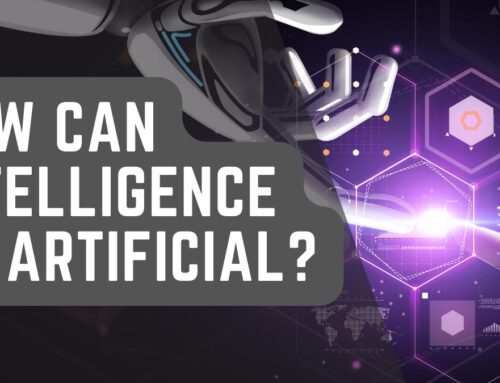While artificial intelligence (AI) is making headlines today, the concept of “thinking machines” can be traced back to ancient philosophers and mathematicians. The phrase artificial intelligence was first used in the mid-20th century, at the dawn of the computer age. Like most transformative innovations throughout history, AI’s possibilities have been met with a combination of excitement, skepticism, and fear.
What is AI?
AI is a branch of computer science that focuses on giving machines or computer-controlled robots the ability to execute intelligent tasks. AI aims to create intelligent machines that can replicate human behavior by programming them to think and learn like people.
Is AI a new concept?
Many AI applications are new, but the theory and some basic technology have existed for years. Innovators have built on their predecessors’ work and brought us to the AI inflection point we are at today. Here’s a brief history of AI and how it has improved people’s lives over time.1
Keep in mind that any companies are mentioned for descriptive purposes only. It should not be considered a solicitation for the purchase or sale of their securities. Any investment should be consistent with your objectives, time frame, and risk tolerance.
1950’s
Claude Shannon published an article discussing a chess-playing computer program and Alan Turing created a test to determine whether a machine could imitate human conversation.
1960’s
The first chatbot, called ELIZA, was created at MIT in 1965. ELIZA was an interactive computer program that could functionally converse with a person in English.
1970’s
In 1970, WABOT-1, the first anthropomorphic robot, was built in Japan at Waseda University. Its features included movable limbs and the ability to see and converse.
1980’s
WABOT-2 was built in 1980 and allowed the humanoid robot to communicate with people, read musical scores, and play music on an electronic organ. In 1986 Mercedes-Benz released a driverless van.
1990’s
In 1994, Brian Pinkerton developed WebCrawler, the first full-text crawler-based Web search engine. It was the first search engine that allowed users to search for any word on a web page, which changed the standard for all future search engines.
2000’s
Face detection started to be implemented in cameras, improving photography. Machine learning algorithms also began to detect fraudulent financial transactions.1
2010’s
AI improved search engine functionality, voice assistants, and self-driving cars. AI also started being used more extensively in healthcare for diagnostics, risk analysis, and treatment plans.1
A humanoid robot named Sophia, created in 2018, became the first “robot citizen” because of her likeness to an actual human being, with her ability to see, make facial expressions, and communicate through AI.
2020’s
In 2022, OpenAI launched ChatGPT. It can generate human-like responses in conversational settings. It has been trained on a vast amount of text data from the internet, allowing it to understand and generate coherent and contextually relevant responses to a wide range of questions submitted by a user.
We want to remind you that any companies are mentioned for descriptive purposes only. It should not be considered a solicitation for the purchase or sale of their securities. Any investment should be consistent with your objectives, time frame, and risk tolerance.
What is the Future of AI?
Because of its ability to quickly assimilate massive quantities of data and use generative learning to refine its abilities to make them more useful, АI has applications in almost every field. Here are a few of the industries we think AI will influence over time:4
- Health Care
- Education
- Financial Services
- Transportation
- Military
- Cybersecurity
- Marketing
- Customer Service
- Retail
Should I be Concerned About AI Taking Over the World?
Could AI infuse machines with capabilities that outstrip those of humans? It’s true that computers may analyze data and respond to queries at speeds far exceeding our human capacities. However, this doesn’t automatically equate to a higher level of expertise. Hence, the scenario of machines overrunning our world remains largely a matter of science fiction.
Rather than viewing AI as a potential menace, we should acknowledge it as the potent tool it truly is. Its groundbreaking influence extends far beyond the corporate world, inspiring innovative developments in fields as diverse as healthcare, education, and more. This transformative potential of AI to redefine various aspects of our lives underscores its significant role in shaping the future of our interconnected world.
There are, however, legitimate concerns about AI’s potentially disruptive impact on the economy, jobs, ethics, security, accountability, and overall societal well-being. Lawmakers, regulators, industry leaders, and researchers should work together to address these concerns and develop responsible AI practices and policies. Unilateral action to slow the adoption and development of AI may put the U.S. at a competitive disadvantage, so any action needs to consider all implications.
Will AI Impact the Way I Interact with my Advisor?
The role of AI in financial services has been increasing and will likely continue to expand. AI allows firms to automate certain aspects of running the business, especially back office and operational functions. Advisors will use AI as they have other new technology over the years, allowing them to be more efficient and spend more time with clients.
As you know, the most important financial decisions are rarely black or white and usually do not have simple right or wrong answers. Providing financial guidance is much more nuanced and informed by each client’s goals, time horizon, risk tolerance, and, of course, emotional factors.
While AI will likely be able to help with most of the data-driven technical aspects of financial services going forward, the human element is expected to be essential.
We are Always Here to Answer Your Questions
As we have seen throughout history, not all new technologies live up to their potential. But some far outperform expectations and change the way we live. The personal computer, the internet, and cell phones are a few we have seen in our lifetimes. Will AI be the next? Maybe. It is one of the more transformative technologies of the 21st century so far, and we will continue to learn of new ways in which it impacts businesses and even everyday life.
1G2.com, May 25, 2021. “A Complete History of Artificial Intelligence.”
2 Britannica.com, 2023
3 Soft-Surge.com, 2023. “A Brief History of Web Crawlers.”
4 MITTechologyReview.com, March 3, 2023




